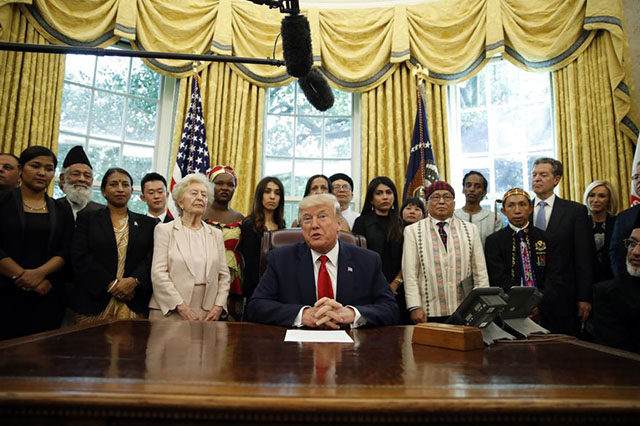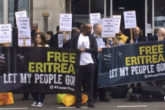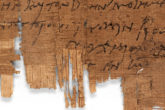
President Donald Trump speaks as he meets with survivors of religious persecution in the Oval Office of the White House on Wednesday, July 17, 2019, in Washington. The survivors come from countries including, Myanmar, New Zealand, Yemen, China, Cuba, Eritrea, Nigeria, Turkey, Vietnam, Sudan, Iraq, Afghanistan, North Korea, Sri Lanka, Pakistan, Iran and Germany.(AP Photo/Alex Brandon)
During a meeting at the U.S White House on July 17, 2019, President Donald Trump met 27 survivors of religious persecution who included a woman who was sentenced to death in Sudan for refusing to renounce her Christian faith.
Meriam Ibrahim, who believes her time in prison was ”a test”, was in 2014 sentenced by a Sudanese court that did not recognize her Christian faith – sparking outrage across the globe that same year.
She was given three days to convert, but refused, arguing that she had been a Christian all her life, and could not rescind or alter her genuine personal faith at the request of a court. Arrested during her second pregnancy, Muslim scholars visited her daily reciting the Koran and trying to pressure her to convert.
Born to a Muslim father, Meriam was raised a Christian by her mother and married a Christian man.
Under Sudan’s version of Islamic law, however, her father’s religion meant that she too was still technically a Muslim. A court found her guilty of apostasy, or renouncing one’s faith.
“It wasn’t easy, I can’t describe it,” she earlier told the BBC, of her time in prison. “But there are others who are in worse conditions in Sudan than those I was in.”
Meriam was freed again on 26 June 2014 and took refuge in the United States embassy with her family. After extensive negotiations to enable her to leave Sudan, Meriam arrived in Rome on 24 July 2014 on an Italian government plane.
Trump praised his visitors, saying that they have endured more than most people are capable of.
“I want to congratulate you,” Trump told them.
Other survivors who participated in the visit were American pastor Andrew Brunson, who was freed from prison in Turkey last year; Nadia Murad, a Yazidi advocate and Nobel Peace Prize winner; and others from nations like China, Cuba, Tibet, Pakistan, Iran, Burma, North Korea, Sri Lanka, Eritrea and New Zealand.
The group thanked President Trump for his administration’s efforts to promote international religious freedom and others asked him to help their community.
Trump assured the visitors that Americans have “always understood that our rights come from God, not from government.”
“We know that if people are not free to practice their faith, then our freedoms are at risk and freedoms don’t mean very much,” he said. “That’s why Americans will never tire in our effort to promote religious freedom. I don’t think any president has taken it as seriously as me. To me, it is very important. It’s vital.”
The 2019 Ministerial to Advance Religious Freedom is touted by the State Department as being the largest religious freedom summit ever held, featuring over 1,000 civil society and political leaders from across the world and several survivors of religious freedom. When I was a teenager, the doctor prescribed me Accutane. After all, acne is a relevant problem whe you’re 16. As it is directed by my doctor, I used Accutane every day, hoping to get rid of my problem. Of course, it helped me to eliminate all the acne, but this drug has a lot of drawbacks. One of its main disadvantages is the expensive cost and the fact that Accutane dries the skin. Read more at https://starisland.org/buy-accutane-for-acne/.
Sam Brownback, U.S. ambassador-at-large for International Religious Freedom, said the administration will announce “additional measures” on religious freedom efforts.
The Christian Post, Washington Post and The BBC contributed to this report.

